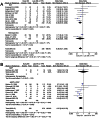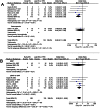Enteral nutrition within 48 hours of admission improves clinical outcomes of acute pancreatitis by reducing complications: a meta-analysis
- PMID: 23762266
- PMCID: PMC3675100
- DOI: 10.1371/journal.pone.0064926
Enteral nutrition within 48 hours of admission improves clinical outcomes of acute pancreatitis by reducing complications: a meta-analysis
Abstract
Background: Enteral nutrition is increasingly advocated in the treatment of acute pancreatitis, but its timing is still controversial. The aim of this meta-analysis was to find out the feasibility of early enteral nutrition within 48 hours of admission and its possible advantages.
Methods and findings: We searched PubMed, EMBASE Databases, Web of Science, the Cochrane library, and scholar.google.com for all the relevant articles about the effect of enteral nutrition initiated within 48 hours of admission on the clinical outcomes of acute pancreatitis from inception to December 2012. Eleven studies containing 775 patients with acute pancreatitis were analyzed. Results from a pooled analysis of all the studies demonstrated that early enteral nutrition was associated with significant reductions in all the infections as a whole (OR 0.38; 95%CI 0.21-0.68, P<0.05), in catheter-related septic complications (OR 0.26; 95%CI 0.11-0.58, P<0.05), in pancreatic infection (OR 0.49; 95%CI 0.31-0.78, P<0.05), in hyperglycemia (OR 0.24; 95%CI 0.11-0.52, P<0.05), in the length of hospitalization (mean difference -2.18; 95%CI -3.48-(-0.87); P<0.05), and in mortality (OR 0.31; 95%CI 0.14-0.71, P<0.05), but no difference was found in pulmonary complications (P>0.05). The stratified analysis based on the severity of disease revealed that, even in predicted severe or severe acute pancreatitis patients, early enteral nutrition still showed a protective power against all the infection complications as a whole, catheter-related septic complications, pancreatic infection complications, and organ failure that was only reported in the severe attack of the disease (all P<0.05).
Conclusion: Enteral nutrition within 48 hours of admission is feasible and improves the clinical outcomes in acute pancreatitis as well as in predicted severe or severe acute pancreatitis by reducing complications.
Conflict of interest statement
Figures








References
-
- Pezzilli R, Uomo G, Zerbi A, Gabbrielli A, Frulloni L, et al. (2008) Diagnosis and treatment of acute pancreatitis: the position statement of the Italian Association for the study of the pancreas. Dig Liver Dis 40: 803–808. - PubMed
-
- Petrov MS, Shanbhag S, Chakraborty M, Phillips AP, Windsor JA (2010) Organ failure and infection of pancreatitis necrosis as determinants of mortality in patients with aucte pancreatitis. Gastroenterology 39: 813–820. - PubMed
-
- Ammori BJ, Fitzgerald P, Hawkey P, McMahon MJ (2003) The early increase in intestinal permeability and systemic endotoxin exposure in patients with severe acute pancreatitis is not associated with systemic bacterial translocation: molecular investigation of microbial DNA in the blood. Pancreas 26: 18–22. - PubMed
-
- Balzan S, de Almeida Quadros C, de Cleva R, Zilberstein B, Cecconello I (2007) Bacterial translocation: overview of mechanisms and clinical impact. J Gastroenterol Hepatol 22: 464–471. - PubMed
Publication types
MeSH terms
LinkOut - more resources
Full Text Sources
Other Literature Sources
Medical

